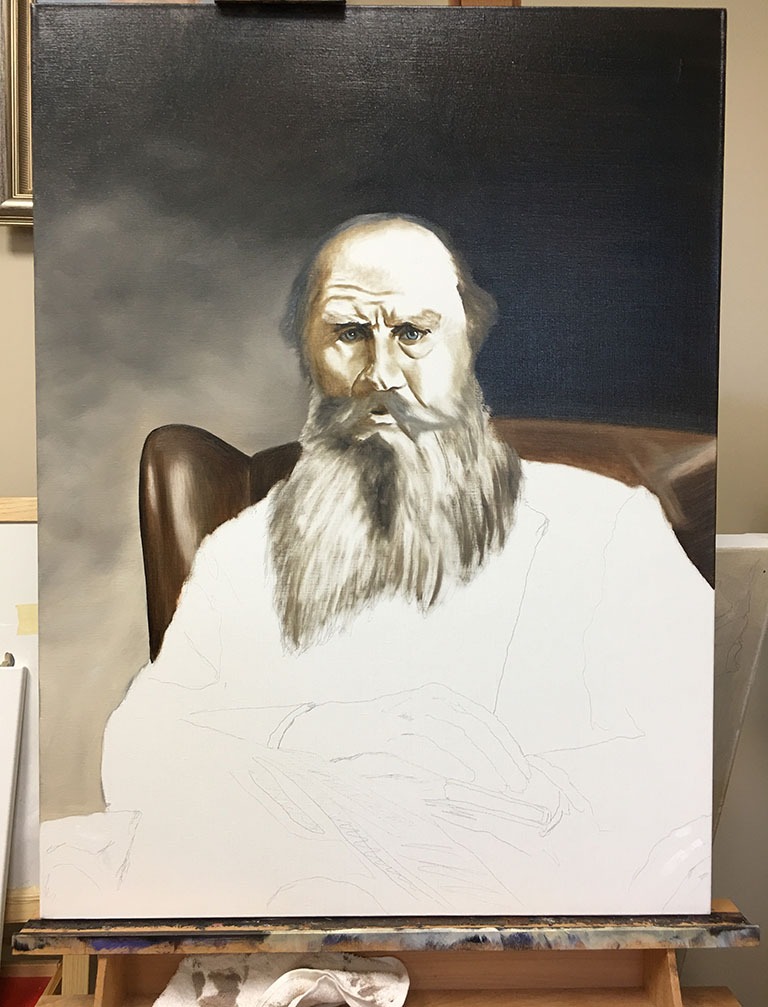Leo Tolstoy Archive
Written: 1904
Source: "Fables for Children," by Leo Tolstoy, translated from the original Russian and edited by leo Wiener, assistant Professor of Slavic Languages at Harvard University, published by Dana Estese Company, Boston, Edition De Luxe, limited to one thousand copies of which this is no. 411, copyright 1904, electrotyped and printed by C. H. Simonds and Co., Boston, Massachusetts, USA.
Transcription/Markup: Andy Carloff
Online Source: RevoltLib.com; 2021

From the Cossack village I did not travel directly to Russia, but first to Pyatigórsk, where I stayed two months. Milton I gave away to a Cossack hunter, and Búlka I took along with me to Pyatigórsk.
Pyatigórsk [in English, Five-Mountains] is called so because it is situated on Mount Besh-tau. And besh means in Tartar "five," and tau "mountain." From this mountain flows a hot sulfur stream. It is as hot as boiling water, and over the spot where the water flows from the mountain there is always a steam as from a samovár.
The whole place, on which the city stands, is very cheerful. From the mountain flow the hot springs, and at the foot of the mountain is the river Podkúmok. On the slopes of the mountain are forests; all around the city are fields, and in the distance are seen the mountains of the Caucasus. On these the snow never melts, and they are always as white as sugar. One large mountain, Elbrus, is like a white loaf of sugar; it can be seen from everywhere when the weather is clear. People come to the hot springs to be cured, and over them there are arbors and awnings, and all around them are gardens with walks. In the morning the music plays, and people drink the water, or bathe, or stroll about.
The city itself is on the mountain, but at the foot of it there is a suburb. I lived in that suburb in a small house. The house stood in a yard, and before the windows was a small garden, and in the garden stood the landlord's beehives, not in hollow stems, as in Russia, but in round, plaited baskets. The bees are there so gentle that in the morning I used to sit with Búlka in that garden, among the beehives.
Búlka walked about between the hives, and sniffed, and listened to the bees' buzzing; he walked so softly among them that he did not interfere with them, and they did not bother him.
One morning I returned home from the waters, and sat down in the garden to drink coffee. Búlka began to scratch himself behind his ears, and made a grating noise with his collar. The noise worried the bees, and so I took the collar off. A little while later I heard a strange and terrible noise coming from the city. The dogs barked, howled, and whimpered, people shouted, and the noise descended lower from the mountain and came nearer and nearer to our suburb.
Búlka stopped scratching himself, put his broad head with its white teeth between his fore legs, stuck out his tongue as he wished, and lay quietly by my side. When he heard the noise he seemed to understand what it was. He pricked his ears, showed his teeth, jumped up, and began to snarl. The noise came nearer. It sounded as though all the dogs of the city were howling, whimpering, and barking. I went to the gate to see what it was, and my landlady came out, too. I asked her:
"What is this?"
She said:
"The prisoners of the jail are coming down to kill the dogs. The dogs have been breeding so much that the city authorities have ordered all the dogs in the city to be killed."
"So they would kill Búlka, too, if they caught him?"
"No, they are not allowed to kill dogs with collars."
Just as I was speaking, the prisoners were coming up to our house. In front walked the soldiers, and behind them four prisoners in chains. Two of the prisoners had in their hands long iron hooks, and two had clubs. In front of our house, one of the prisoners caught a watch-dog with his hook and pulled it up to the middle of the street, and another began to strike it with the club.
The little dog whined dreadfully, but the prisoners shouted and laughed. The prisoner with the hook turned over the dog, and when he saw that it was dead, he pulled out the hook and looked around for other dogs.
Just then Búlka rushed headlong at that prisoner, as though he were a bear. I happened to think that he was without his collar, so I shouted: "Búlka, back!" and told the prisoners not to strike the dog. But the prisoner laughed when he saw Búlka, and with his hook nimbly struck him and caught him by his thigh. Búlka tried to get away; but the prisoner pulled him up toward him and told the other prisoner to strike him. The other raised his club, and Búlka would have been killed, but he jerked, and broke the skin at the thigh and, taking his tail between his legs, flew, with the red sore on his body, through the gate and into the house, and hid himself under my bed.
He was saved because the skin had broken in the spot where the hook was.